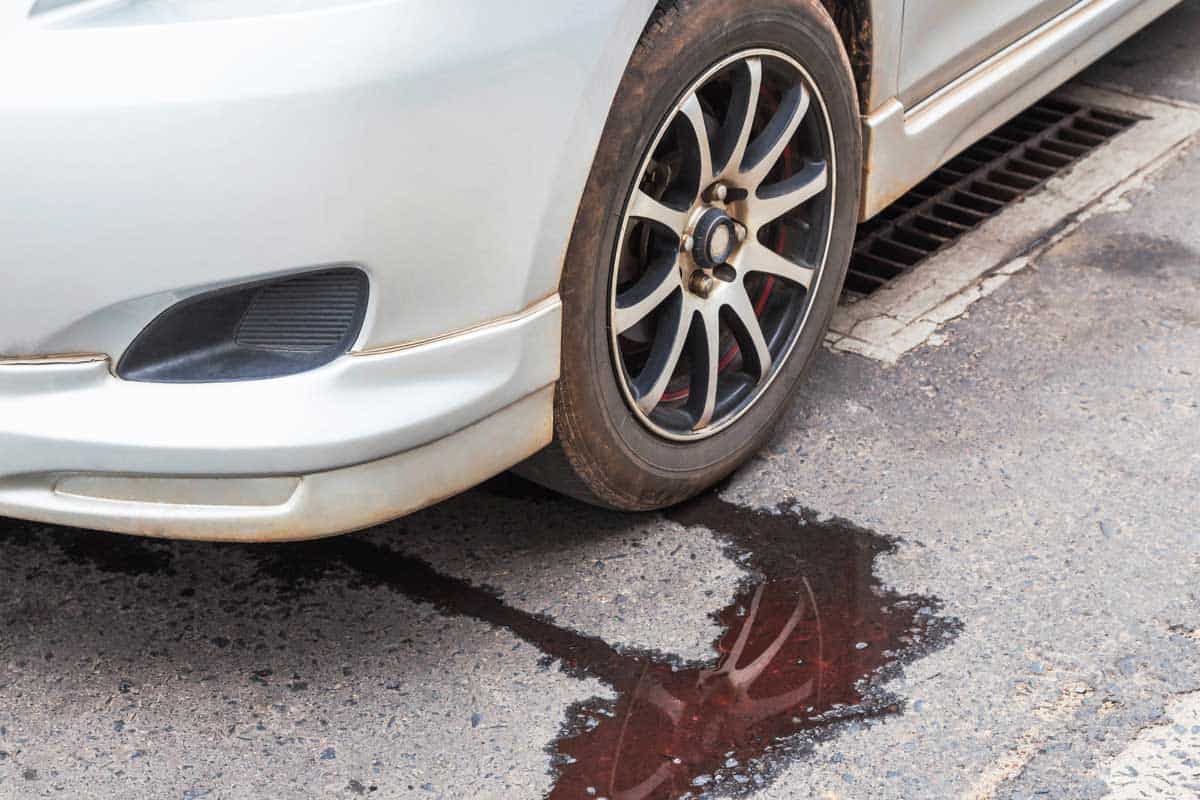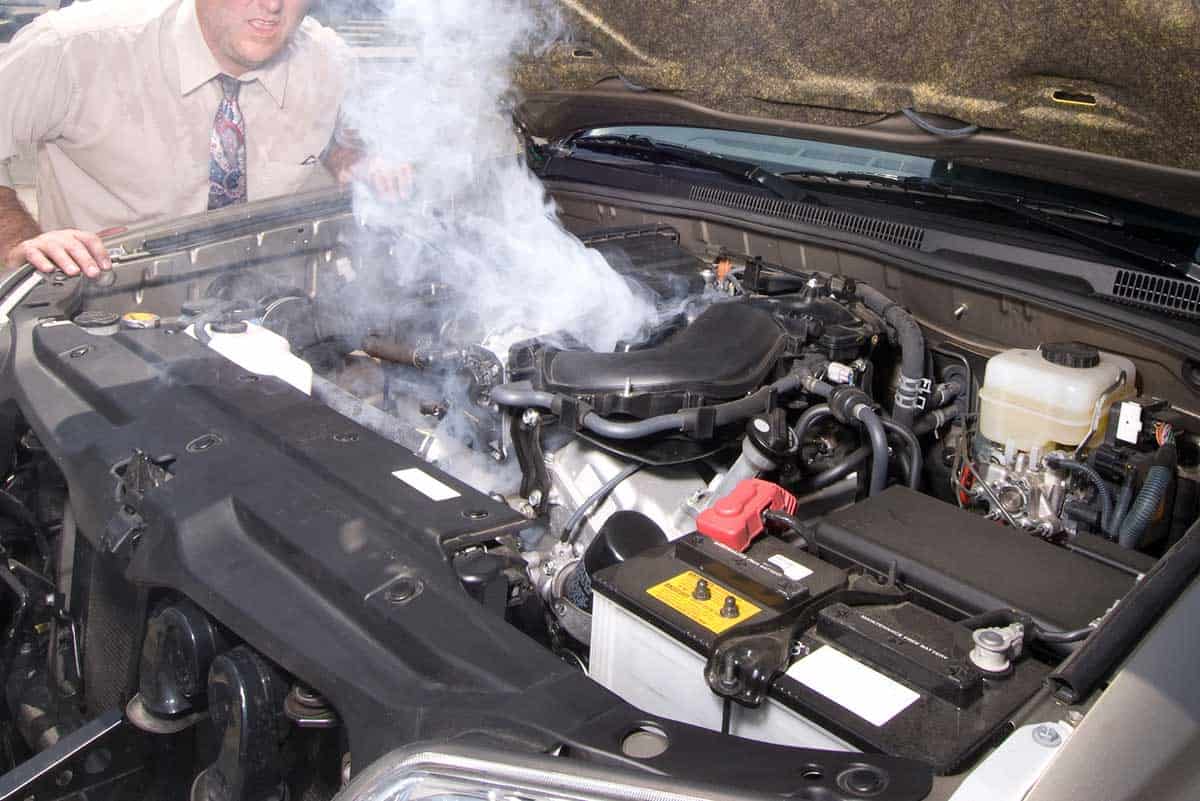Does it seem unusually hot in your car? At first, you think that your car is about to explode, but maybe the thermostat is failing. If you are trying to answer the burning question of why your car overheats, we can help. We’ve done extensive research to provide sets of potential problems, and solutions, to what makes a car overheat.
It is pretty normal for cars to overheat, but with proper maintenance you can prevent this from happening. Potential causes for a car to overheat include:
- Cooling system leaks
- Failure of the thermostat
- A broken water pump
- Little or no coolant
- Issues with the hoses and belts
Now, you probably have even more questions. Keep reading, as we discuss everything about cars overheating; from what causes your vehicle to overheat while driving, to whether you can drive your car after it overheats. Get the answers you need to keep your car on the road safely.
![Unrecognisable over heated off-road vehicle broken in the mountains, What Makes A Car Overheat? [5 Common Reasons]](https://vehq.com/wp-content/uploads/2020/08/What-Makes-A-Car-Overheat-5-Common-Reasons.jpg)
What Makes A Car Overheat?
Cooling System Leaks
When there’s a leak in the coolant reservoir tank, air enters the system through the leak. The coolant drips through the puncture, causing room for air to be pulled in. You can quickly identify leaks by finding puddles or spots on the ground.
The air in the system creates a massive bubble, referred to as an airlock, that fills the space at the upper part of the cooling system. The airlock prevents coolant from reaching the engine; therefore, causing the engine to overheat.
Failure Of The Thermostat
Thermostats are a crucial component in vehicles because they accurately regulate the flow of coolant through the radiator to get, and maintain, the desired engine operating temperature.
They also consistently monitor the temperature of the coolant. Failure of the thermostat could harm the engine because it prevents the coolant from flowing as the manufacturer had intended.
A Broken Water Pump

A water pump ensures that the coolant keeps moving through hoses and radiator, the engine block, and maintains the required operating temperature. It is set into motion by an auxiliary belt from the crankshaft pulley.
Via centrifugal force and impeller blades, a water pump moves cooled water into the car’s engine where combustion occurs. If the coolant has either an excess buildup of impurities or is dirty, it will have trouble running through the pump smoothly. This can cause overheating.
Little Or No Coolant
Also known as antifreeze, coolant keeps an engine from freezing and protects components from corrosion. Its job is to keep the engine’s heat balance in check by eliminating heat from the engine. Amply flowing coolant is essential in ensuring that the engine functions as it should.
Driving without the recommended coolant levels may lead to a coolant system failure that will eventually result in your car overheating.
Issues With The Hoses And Belts
Hoses and belts are involved in processes within the engine, cooling system, charging system, and air conditioning system.
Frayed belts, or coolant hoses that are ruptured, leaking, or blocked can compromise the maintenance of coolant and airflow to and from the engine and other similar systems. This results in sudden engine damage, and subsequently overheating in the car.
What Causes Car To Overheat While Driving?
High temperature is the number one cause of your car overheating as you drive it. Like many mechanical engines, your car has an optimal temperature range where it’s at its best. Should the engine temperature hit either extreme- too cold or too hot- it can lead to some serious problems.
Other common causes include a blockage in the cooling system, and poor ventilation in the car on a hot day.
If you observe the following signs of overheating, pull over to examine your car more closely:
- Hear a ticking noise or thumping sounds from the engine
- Car hood is overly hot or see steam floating out of the hood
Can I Drive My Car After It Overheats?

Yes, but you can only drive your car after it overheats when the engine cools down. If the overheating issue is non-recurrent, overheating could be caused by getting stuck in traffic congestion, driving on a hot day, or leaving the air-conditioning running.
To be safe, especially after overheating, please look frequently at the temperature gauge so that you can avoid other huge problems. Many car manufacturers adjust the temperature gauge to sense increased heating long before a significant problem occurs, so paying attention to this gauge can buy you some time to get the situation under control.
Lessen the strain on the engine after a nasty overheating episode by turning your fans and heat up to the maximum level. Sounds counter-intuitive? Not exactly. Heat fans suck heat in from the engine to keep the inside of your vehicle warm.
Yet another tip, turn off the air conditioning. The air conditioning system uses the engine’s power to warm or cool off the car. A better alternative to using AC is opening the windows.
Driving for shorter stretches also goes a long way in keeping the engine functional during overheating. Drive for shorter stretches, switch off your vehicle, and repeat the procedure to eventually arrive where you are going.
Remember to check the temperature gauge, so you know when to take your hands off the wheel and let the engine cool off some more.
Can Low Oil Cause Overheating?
Yes, low oil can cause overheating. Oil is the blood for all car engines. It’s used to lubricate internal combustion engines and clean the engine from varnish and sludge.
Oil consists of corrosion and rust inhibitors that offer protection from usual wear and tear. This assists in lowering oil oxidation and ensures the engine’s longevity and top performance.
Engine oil also has a coolant feature to keep the upper engine and its running parts cool. Low oil levels increase engine temperatures.
Valvoline Oil
Quality engine oils that keep your engine healthy include Valvoline's High Mileage 10W-30 Motor Oil; best for high-mileage vehicles. It has some added detergents in the blend to prevent deposit build-ups.
Click here to find this product on Amazon.
Liqui Moly Oil
Liqui Moly Premium 5W-40 Synthetic Motor Oil is another top pick. With it, your engine runs more quietly and smoothly. It protects your engine from engine wear and keeps it clean. Additionally, it fosters rapid oil delivery at low temperatures and high lubrication reliability at low and high temperatures.
Click here to see this on Amazon.
What To Do If Your Coolant Is Boiling?
Overheating can cause coolant to boil. Most importantly, if this happens to you, DO NOT remove the coolant cap immediately. You could sustain major burns since the engine is smoking hot. Allow the car to sit for at least 30 minutes before trying to remove the cap.
Next, check inside the coolant overflow tank to ensure that the fluid is at the right level. If the fluid is boiling, that’s a sign that there’s something wrong in the system. The highest probability is the water level is too low. Luckily, there’s usually an indicator on the side of the overflow tank, so you won’t have to guesstimate. Fill the tank as needed, after it has sufficiently cooled.
![Unrecognisable over heated off-road vehicle broken in the mountains, What Makes A Car Overheat? [5 Common Reasons]](https://vehq.com/wp-content/uploads/2020/08/Unrecognisable-off-road-vehicle-broken-due-to-car-overheat-in-the-mountains.jpg)
It’s our sincere hope that this post was helpful. Hopefully, overheating won’t happen to your car, but if it does you can apply all you’ve learned for positive results!


